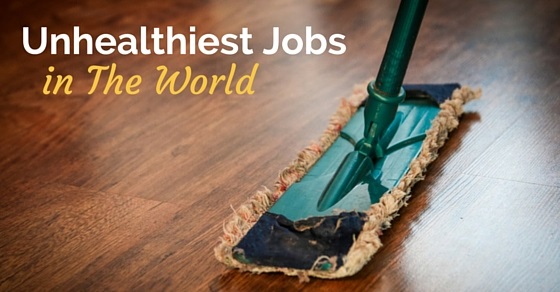Making a career choice is considered as one the most important decision in the world, but the question to be asked is, will your career choice lead you into a healthy job or will you risk your health. We all are well versed with the phrase that “Health is Wealth” but today the world we live in understands only one language – MONEY! In this run for money, many people are often forced to risk their lives either by choice or by necessity. We have listed some of the unhealthiest job in the world which includes both highly illiterate jobs along with highly literate jobs.
Unhealthiest Jobs among illiterate masses and very low income – These are the jobs which people are forced to take up to support their living. They have to risk their lives in order to make some money.

Top Dangerous Jobs to Your Health:
1. Sanitation Workers, Manual Scavenging:
The work of sanitation workers involves working in unhealthiest environment and are at greater risk of suffering from many health issues. They are forced to work in an environment which is contaminated with unknown harmful contents.
The manual scavenging, being most common in India is probably the most inhumane job in the world where humans are employed to manually clean, carry and dispose human excreta from sewers and dry latrines. Though manual scavenging is illegal, according to a survey by Sulabh 4 to 5 million people in India were working as scavengers in 2005 which sadly were appointed by local civic bodies. The workers from this industry are daily exposed to various health hazards that include exposure to harmful gases, respiratory disorders, skin problems, musculoskeletal disorders and various other toxic infections.
2. Lumberjack
This job makes its way to the list of unhealthiest jobs due to the deadly combination of big trees, sharp saws, extreme conditions and hard hours. According to BLS, loggers are 30X more likely to die on the job than the average American worker. According to Jobsrated.com and CNBC.com, about 82 in every 100,000 lumberjacks die each year on the job, often as a result of “natural” deaths, otherwise known as falling trees. Other means of death include equipment malfunctioning and accidental amputations.
3. Deep Sea Fishing:
This job is associated with lot of physical accidents along with other severe medical conditions. The job is on top of the list because it separates the worker from his normal life to deep into the sea for long hours consuming most of his time and energy. The work environment is very uncomfortable in most cases and is a most unstable job. The main problems of deep sea fishing are accidents and injuries, musculoskeletal problems, stress, hearing problems caused by noise and skin burns.
According to the Food and Agricultural Organisation of the United Nations (FAO), globally 24,000 fishermen die each year while out at sea.
4. Miners:
Mining is another job that can destroy your health beyond repairs. Mining along with the constant threat of physical harm, cave-ins is associated with a variety of other health concerns. Due to high levels of dust and other chemical particulates the miners are at constant risk of respiratory damage. The other disorders include COPD (Chronic Pulmonary Obstructive Disease), CWP (Coal Worker’s pneumoconiosis) which is commonly known as black lung, PMF (Progressive Massive Fibrosis). Along with all this, the loud noise created by equipment-mining is becoming a major threat of damage to hearing.(The U.S. Mine Safety and Health Administration, MSHA)
5. Metal Crafters:
The metal crafters main area of work is to cast, set and handle metal constructions. During the constructions of buildings, they have to deal with heavy materials and metal equipment at dangerous heights.
They are exposed to negative health effects due to inhalation of smoke, fumes and other chemicals.
6. Slaughter Workhouse:
This is one of the heavily exploited job where workers are forced to work for longer hours without any breaks. The rate of injury is 3 times higher in slaughter workhouses as compared to other manufacturing and processing jobs. Often, these injuries are the result of demand for speed at assembly lines for the killing and processing of animals. In an industry where profit margins are slim and volume is everything, workers are endlessly pressured to kill more animals in less time. Many times workers are required to slaughter 50 cattle per hour. Rather than regulate line speeds in the interest of worker safety, line speed is limited only by federal sanitation laws. (Source: NIOSH – The National Institute of Safety and Health)
7. E waste Recycler:
With technology progressing every year and completely replacing the old technology have you ever wondered where your old phones or computers, used batteries, old tv sets and refrigerators that are no longer in use go. This is where the e-recycles jobs comes in, a job where the worker is forced to sort amongst heaps of broken parts, with some chemicals oozing in and out affecting the overall health of workers. The workers here are exposed to various toxic chemicals like lead, mercury, PVC (Poly Vincly Chloride), BFR (Brominated Flame Retardants), cadmium, beryllium and phosphor compounds which are the cause of some serious health problems affecting central and peripheral nervous system, the reproductive system, causing skin and lung cancer and many other neurological, pulmonary and cardiovascular diseases. (Source: www.unep.org)
8. Stunt men:
This job keeps you at a risk of death at any moment. This job is full of unpredictable fatal accidents. Though the stunt man works hard and risk their lives to give the best shots they are often underrated and mostly left unrecognized for their work.
9. Fire Fighters:
Fire Fighters as the name suggests have to face serious risks on the job. They have to deal with the fire, hot flames, lot of physical and mental stress, and high levels of carbon monoxide gas which is a very toxic gas. Due to the high level of smoke in the surrounding area of work, risk of getting heart diseases, respiratory illness, hepatitis and stress are very common health problems amongst them. Heart attack accounts for 45% of all work related deaths amongst fire fighters.
10. Lab Assistants:
While collecting and handling various bodily fluids, lab assistants are at higher risks of coming in contact with this potentially infectious fluids through accidental skin punctures through needles or spills from a specimen container which have all the possibilities to expose them to blood borne diseases like the AIDS virus, hepatitis virus, malaria, tuberculosis and other life threatening viruses. Not only this, but these people come in close proximity with various hazardous chemicals while preparing specimens for analysis and during sterilization of various medical equipments. Some medical lab assistants also risk exposure to radiations while working with X-ray machines and CT scans.
11. Policing:
From putting their personal safety at risk every single day of work to working late night at odd hours, the policing job is one of the toughest job in existence. According to a study by University of Buffalo, N.Y., the stress of a police officer has significant health risk as compared to the general population for a host of long term physical and mental heath problems. This stress is also linked with insomnia, suicide, obesity, cancer and various general health disorders which police officer suffers compared with the general population. The American literature on police homicide indicates that the police officers are among high risk occupations for homicide. (Brown and Langan, 2001)
12. Water and Waste Water Treatment Plant Operators:
During construction and maintenance of sewage and waste water plants, many workers have fatal risk of drowning, falls, trench collapses. While treating water, there is high exposure to chlorine and hydrogen sulfide gas, which are toxic in nature and have a negative effect on overall health of workers. Sewage and waster water are the main sources of bacteria, fungus, parasites and viruses that can cause intestinal, lung and other infections and make worker very sick. Water borne diseases are another major concern for the people working in this industry, where the workers are surrounded by waste water during all time of work.
Now coming to some of the most lucrative jobs which require you to study and perform hard to prove your worth and get into and give you heavy pay checks, but are still listed amongst the unhealthiest jobs in the world due to detrimental health risks involved while working.
13. Radiologist:
These are the people who are constantly exposed to radiations and are at high risk of developing cancer. According to OSHA, even low doses of radiation received over a long period of time may also slightly increase risk of diseases like cancer and leukemia.
14. Anesthesiologist, nurse anesthetist, technicians:
Anesthesiologists are expected to provide safe and smooth anesthesia services not only in the operation theaters and intensive care units, but also at various remote locations, pre-intervention consultations, pain clinics, magnetic resonance imaging (MRI) suite, and radiotherapy centers. Anesthesiologists are thus exposed to various chemical, biological, mechanical, physical and personal hazards.
15. Dentist:
Dentists are at high risk of many detrimental health issues arising due to regular exposure to mercury. Mercury is a notoriously harmful substance which can cause toxic harm. In fact, a report from WHO, Mercury may cause harmful effects to digestive, nervous, respiratory, immune system and to the kidneys besides lung damage.
16. Astronaut:
Astronauts living on lunar base or going on deep space missions develop serious heath risks. A 2014 study of 11 astronauts found that the heart becomes 9.4% more spherical after long exposure to micro-gravity, or weightlessness in space which might cause heart problems. Sleep deficiencies, hearing loss, kidney stones, lung disorders, confused immune system, radiation hazards, cognitive problems and vision loss are other major problems associated with the profession. Since the beginning of the Russian and American space programs about 430 astronauts have gone to the space with 34 deaths i.e. 7.5% mortality rate, which is significantly higher than many other professions on the list.
17. Flight Attendant:
While ensuring safety, security and comfort airline passengers during flight, flight attendants have to put up with high mental pressure. They are at high risk of sexual harassment, which in return contributes to incidences of depression quite common amongst them. Due to no fresh air in aircrafts, respiratory problems are very common. Fatigue and sleep problems are quite common due to odd working hours. Flight attendants are very much susceptible to a lot of neurological problems like severe headache, dizziness, numbness/ tingling in face/extremities, memory loss, loss of balance/coordination.
18. Immigration and Customs Inspector:
This job involves you to work at irregular hours, thus having a direct effect on your overall health. This job also has exposure to radiations. They are constantly exposed to dangerous situations like bites, cuts, minor burns, and stings.
19. Lawyer:
In comparison the general public lawyers has higher rates of stress and depression. According to 2007 study, only 4 out of 10 lawyers would recommend their career. The major reason why lawyers are so unhappy is because of high stress levels associated with their work.
A study undertaken by LawCare found that 47% of their legal worker participants had felt at breaking point before and 75% of those surveyed said they found their work environment stressful.
Hope this article opens your eyes and make you realize the hardships of people who are constantly at the risk of fatal danger. Many people are forced to work in this hardship job just to live hand to mouth while some make out heavy pay checks. This is the harsh reality. Every job on earth is equally important and so is every person doing the job. The working conditions of these jobs can be improved to an extent, but cannot be ruled out completely. We must extend our love, care and support for these people who risk their lives and treat them wisely when we encounter them next time. So, next time when you complain, realize that not everyone is lucky to sit and work in air conditioned cabins.











































